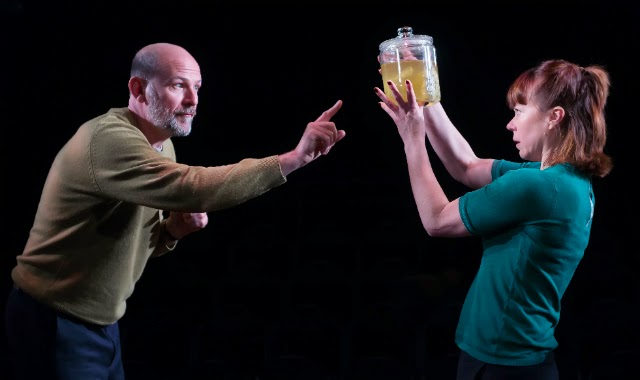'Incognito' review or 'Mind Blowing Theatre'
Incognito,
Nick Payne
Bush
Theatre, 15th May 2014
What
determines our identity? Is it our brains, our memories, our jobs or
relationships? Or is the self as slippery as a flock of starlings, who seem to fly
as one solid mass until – without warning – they break away and the whole
solid-seeming shape falls apart? Nick Payne pricks and prods at the human brain
in his brilliant new play ‘Incognito’. It is a beautiful and mesmerising show which deftly dances around the idea of what it is to be human.
There’s very little breathing space in Joe Murphy’s production and the opening scenes are baffling – exhilaratingly so. Payne jumps between countless plots and sub-plots, all of which play around with the connection between the human brain and sense of self. Four actors play over twenty roles and any coherent sense of time, narrative or character is chucked out the window. Oliver Townsend’s set encases the stage in a fractured metal framework and traps the actors in a world of splintered logic and broken connections. You can practically hear the collective whirring of brains, as the audience struggles to keep up.
Gradually, three main plot threads emerge. One is loosely based on real-life and involves an American doctor, who stole Einstein’s brain and studied it obsessively for the rest of his life. Back in Britain, a neuropsychologist struggles with her job and dates a lady for the first time, following the break up her 25 year marriage. Finally, there is a haunting story about a patient and ex-pianist called Henry who has lost his short term memory and can recognise his wife – but only for a few short and painful seconds.
The stage sparks and fuses with spiralling suggestions, plots and provocations. Just as we’re settling into one story the actors jump into a different role, with just a twist of the head or change of accent. Payne and Murphy delight in teasing us; they lull us into a fall sense of security and continuity and then blow the whole thing apart. Don’t get comfortable – Payne warns us – narrative, identity and the whole of bleeding existence is a very fragile thing.
The actors do a stellar job in Payne’s most demanding play to date – and that’s saying something, considering the brutally exacting nature of his award-winning Constellations. All the actors refuse to take short-cuts and instead find great humour and subtlety in their roles. Amelia Lowdell’s neuropsychologist is tough-headed but warm-hearted and Sargon Yelda is brilliant in a number of warped comic roles but also achingly convincing as the eternally-forgetful husband. Alison O’Donnell is a wonderfully warm comic actress and Paul Hickey brings a persuasive but brittle intellect to all his roles.
The demanding doubling work cleverly plays around with the slippery nature of identity. Yet despite all this jumping around, something consistent emerges. The actors might take on endless roles but a little of their ‘real’ self begins to bleed into every role they play. Characters start to stick and some sort of coherence and meaning wriggles free. There is something distinct and unbreakable about each human, whispers Payne – and then the pianist, who can barely remember his own name, begins to play.



Comments
Post a Comment